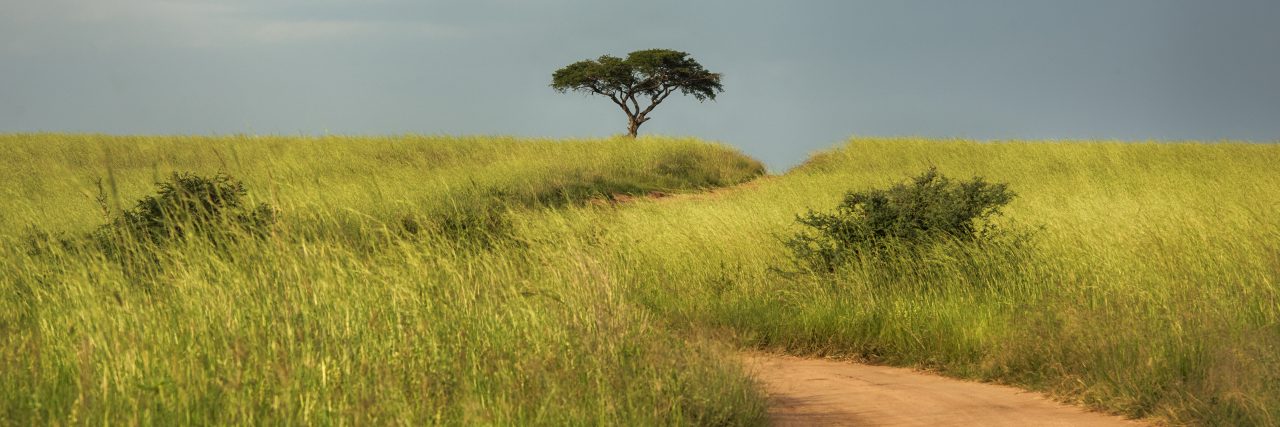Why I'm Speaking Up About the Tribal Living Conditions in Africa as Someone With Cerebral Palsy
When I was 12 months old, I was diagnosed with spastic quadriplegic cerebral palsy. This means I have never walked in my life, I use a powered wheelchair, all my limbs are affected, and I have scoliosis (an S-shaped spine). Growing up with a disability was hard, but I did well at school and managed to attend Sheffield Hallam University to study film and screenwriting. I graduated with First Class Honors and even won the Dean’s Prize for “rising to challenges and demonstrating outstanding personal achievement.” However, while I was at university, my view on film had changed. I’d had a little bit of experience with the industry, but I felt it wasn’t about helping people, which is what I actually wanted to do.
Then, in 2019, I found out about The N/a’an ku sê Foundation, which is located in Namibia, Africa and was founded by Rudie and Marlice van Vuuren in 2006. Their sanctuary cares for animals that can no longer live in the wild, and their Lifeline Clinic provides much-needed medical assistance to the rural communities of local San people. I wrote to them asking if they needed an online volunteer, and now I’m a brand ambassador for them. A few months later, I earned a Distinction in African wildlife and a Level 3 diploma in conservation.
Last year, as part of my work with N/a’an ku sê, I was introduced to Anaki, an 18-year-old who, like me, has cerebral palsy and is part of the San tribe. Marginalized and fighting for survival, the San teeter on the edge of society. The Lifeline Clinic provides free medical treatment, nutritious meals, and all the care that it possibly can, and it was here that Anaki received her diagnosis of cerebral palsy as a child.
Life was hard for Anaki. Up until very recently, she and her grandmother were living under a tree with no shelter of any kind. Thanks to fundraising efforts, however, in December 2020, N/a’an ku sê volunteers were able to build Anaki and her grandmother a house. I donated so Anaki could choose some new items to go in her home. Making Anaki happy felt wonderful. Despite our obvious differences, we both have cerebral palsy, and as far as I was concerned, that made us sisters.
The thing about sisters is they always look after each other. When I later learned that Anaki’s mother, Sarah, was not living close to Anaki and struggled with her mental health, I was spurred into action. I started a GoFundMe campaign so Sarah could have a house built next to Anaki’s to ensure she was no longer homeless and got the care she needed. However, when the GoFundMe reached £295 out of the £1,000 required, I received some tragic news: Sarah had passed away.
Fortunately, we were able to ensure the money raised was given to Anaki so she could have her needs met at this deeply upsetting time. However, as I broke the news, a grim realization hit me: In my part of the world, Sarah’s crisis may well be disregarded as just another tragic tale. But behind those true stories are people — real people, just like us. Our brothers and sisters in humankind. And as I sat in the wake of the death of someone I cared for, I wondered how many more tragic stories in Africa will it take before we step up to rewrite the narrative of the continent?
In lots of countries around the world, big discussions regarding race, rights, and representation are taking place. While this is admirable, there’s also something missing: These protests rarely mention or pay homage to traditional cultures. Instead, these cultures are often referred to as “ancestral,” but they still thrive today, so there’s nothing “ancestral” about them at all. This phrasing has to stop. Tribal and traditional cultures are not something to be gawked at and ridiculed. They are noble, valid ways of living, and I want to protect them.
I want to make people aware of tribal communities — how to honor them by learning their language and traditions, hear them by listening to their stories, and see them by trying to perceive the world through their eyes. Most importantly, I want people to know that although the lives of those in tribal communities are radically different from our own, they don’t need our technology or living standards, and they are not the derogatory Colonial-era slurs people often use. While tribal communities sometimes need our help with getting access to basic things like food and medicine, they don’t need us to Westernize them.
Let me be clear: I do not want to “save” anyone from tribal living. I just want to make people in my own country aware of the San’s plight, which, in their current circumstances, they unfortunately do not have the ability to do themselves. I’m also aware that some others may think I’m another one of the “woke brigade,” but that’s OK — I can take that. What I can’t take anymore, though, is empty promises from those in power who have billions to spare while people like Anaki and Sarah struggle and perish. I will speak out against this inequality again and again — until my mouth is drier than the Namibian sand.
Getty image by guenterguni.

